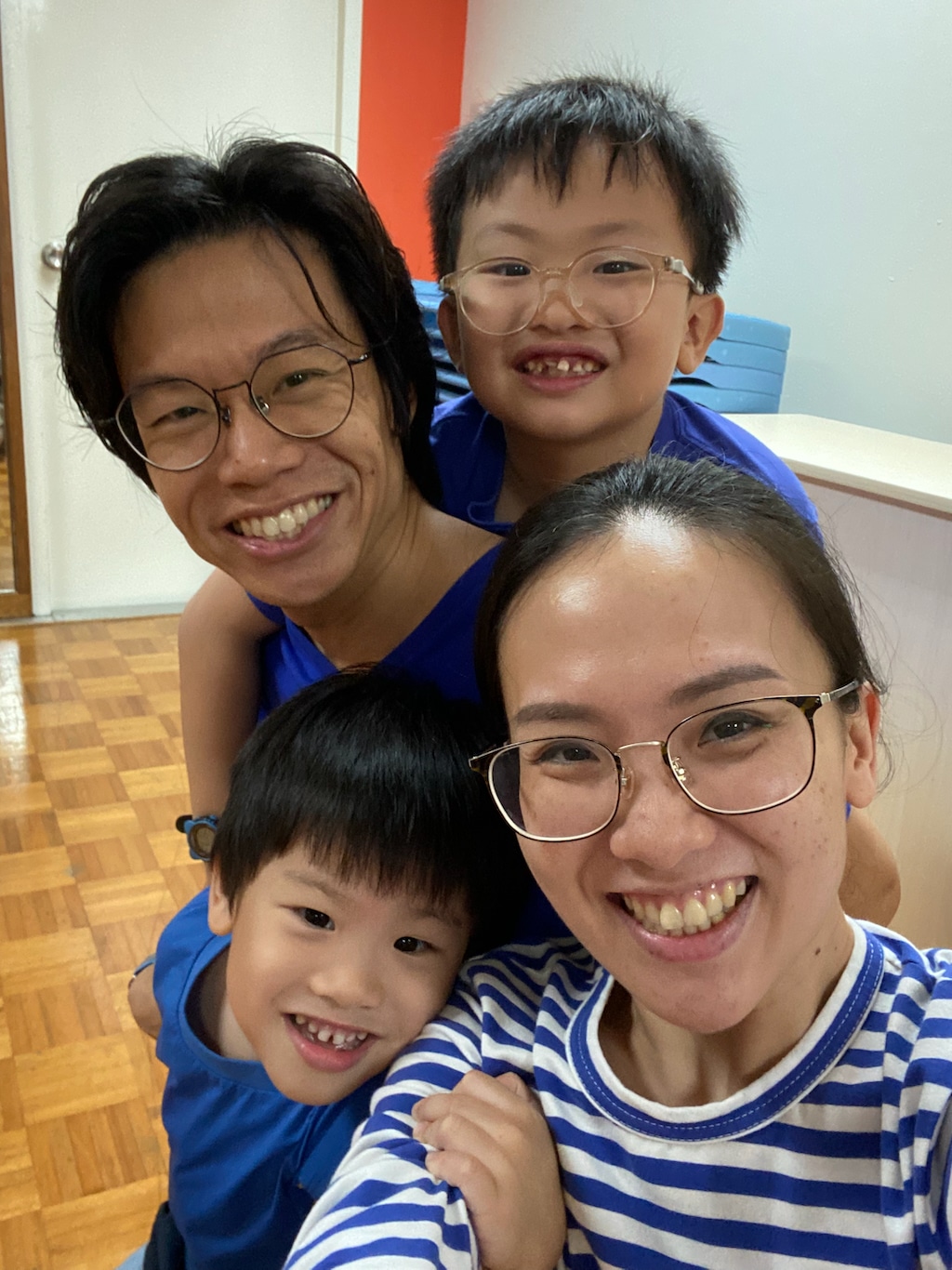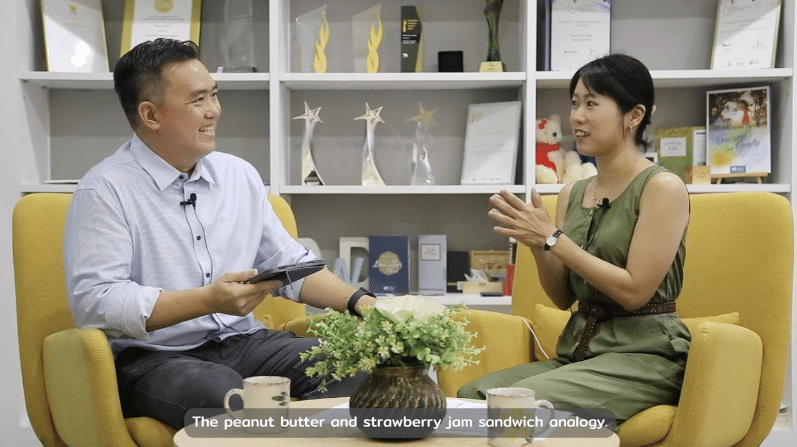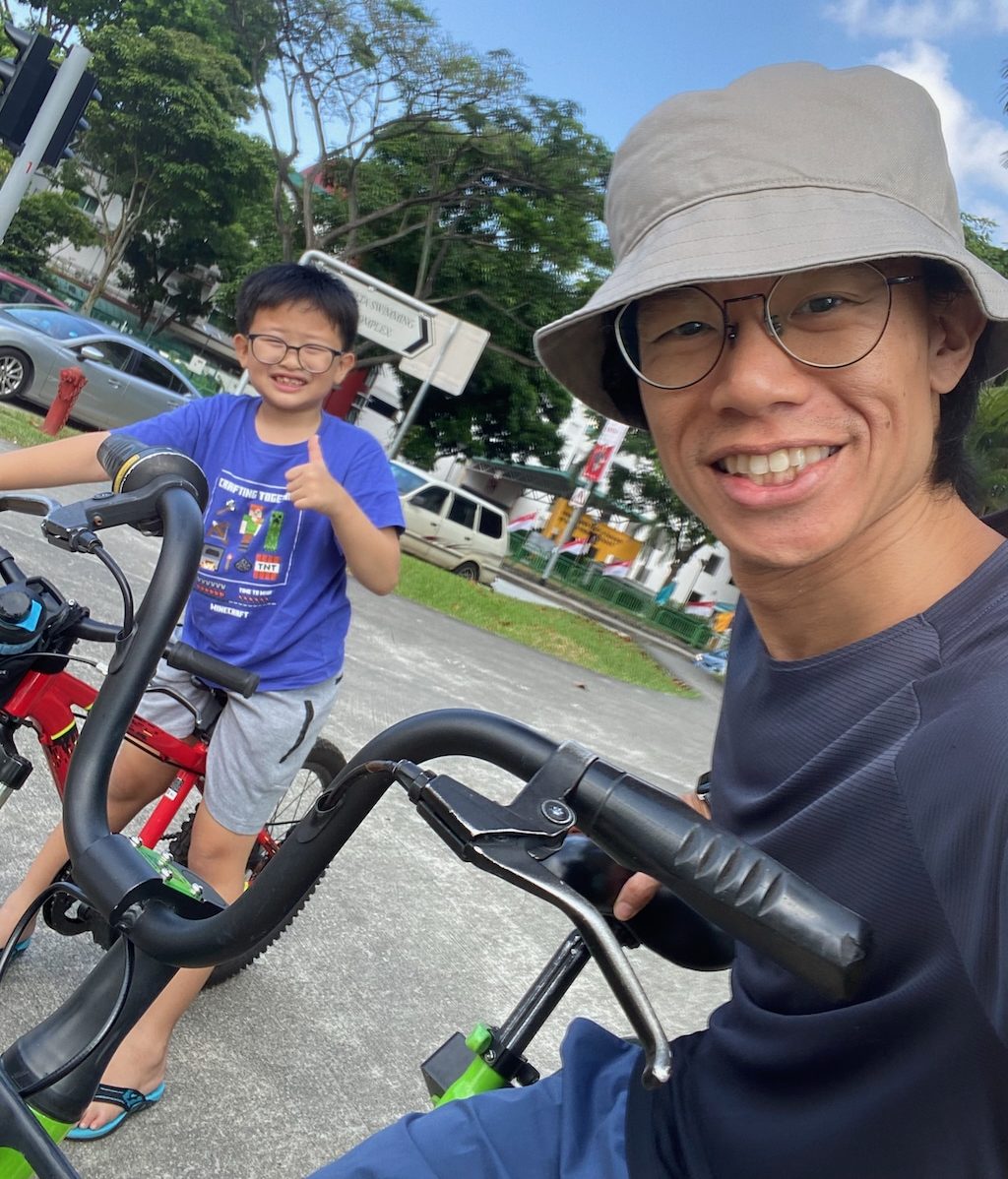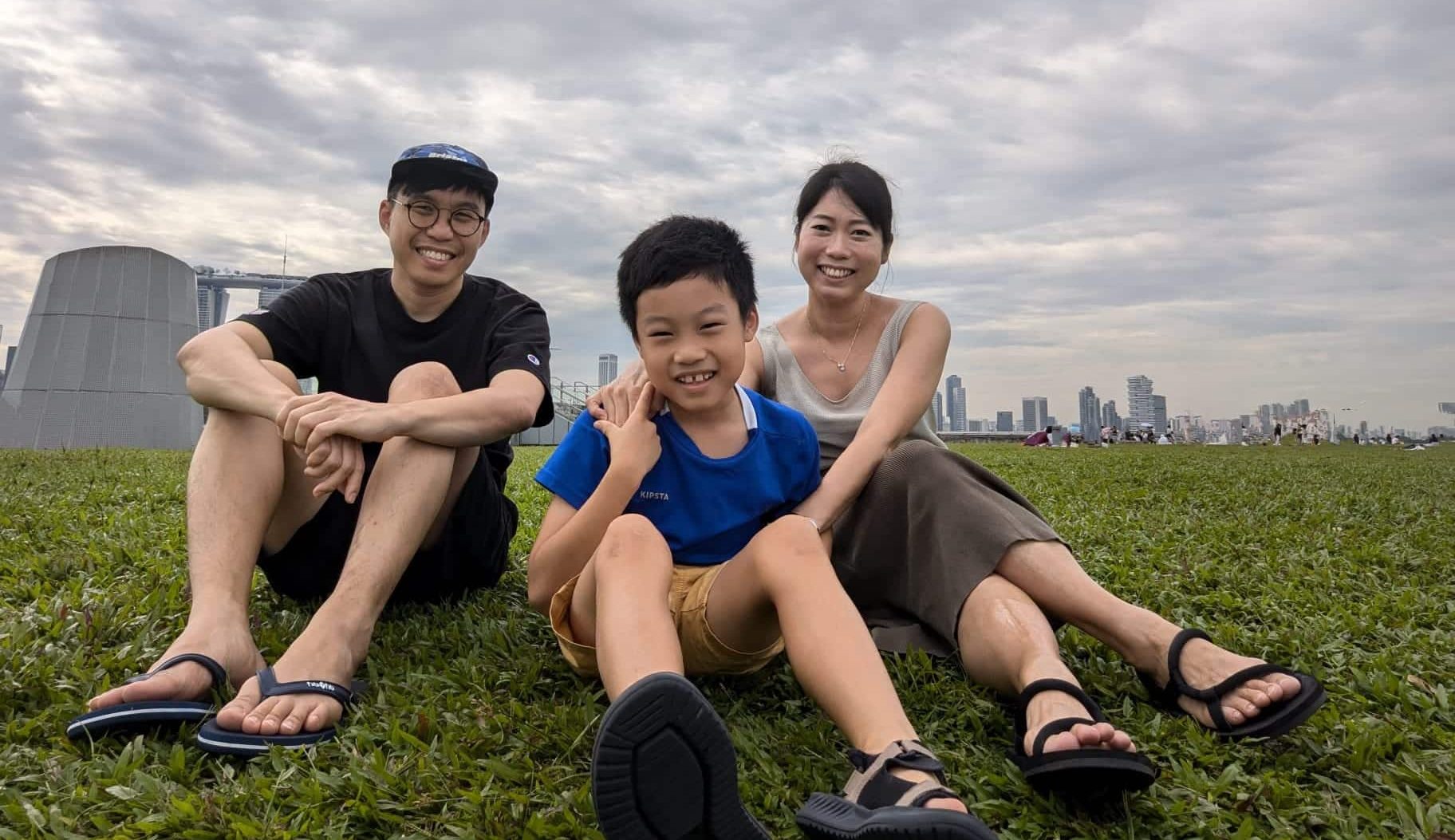Are you equipped to talk to your child about sex? Helping parents to create a culture of conversations
by Gracia Chiang // November 6, 2024, 12:05 pm

Educator and mum Michelle shares in Focus on the Family Singapore's new video series how parents can have conversations with their child about sex. Photos courtesy of Michelle Soon and Josiah Ng.
“Fishballs” and “sausages”.
When Josiah Ng heard his son joke about body parts with his friends at a bus stop, that was a moment of reckoning.
On that day, the stay-home father decided that he had to engage with his eight-year-old on the topic of sex, no matter how uncomfortable it was going to get.
Sharing from his own experience, the 36-year-old is one of two guests featured in Focus on the Family Singapore’s new video series on how parents can have intentional conversations with their children on sex.
This latest initiative follows on from last year’s launch of Talk About Sex, which comprised two sets of videos for lower primary schoolers aged 7–9 and tweens aged 10–12.
Unlike the previous videos that covered questions such as “Where do babies come from?”, “What is puberty?” and “Why is porn bad?”, the focus this time is on equipping parents with tips on how they can navigate conversations about the birds and the bees.
“To be honest, I felt awkward when he first asked.”
From that first encounter Josiah had with his son, it was clear that his child already had some exposure to the topic.
Not long after that, another conversation came up at home, sparked off by his son’s concern over his wife’s menstrual cramps.
One fact led to another, and soon Josiah and his wife found themselves faced with the question of all questions: “Okay, so what’s sex?”
Thanks to bedtime, the couple acknowledged the great question, but told their son it was best answered on another day.
“The next day I woke up, I was frantic. To be honest, I felt awkward when he first asked,” said Josiah, who also has a four-year-old.
“That was kind of how it launched us into trying to find resources on how to talk about sex.”
Revealing how these two incidents kickstarted his journey into sexuality education, Josiah admitted that he was caught off-guard but still glad he could come in early enough while his older son was beginning to form opinions on sex.

Josiah and his wife agreed that he would take the lead in starting the conversation with his sons about sex. But if they had any questions about women, they could always go to their mum to find out more.
Parents as primary educators
“One thing I learned is that there is this thing called the rule of first mention,” said Josiah.
“The person that first mentions a certain topic or a discussion point will actually set the tone of what the subject matter is about.”
Preparing to engage with his boys has also helped Josiah to process his own beliefs so that he can articulate them.
“What is it that we value? What is it that we want to make sure we guard ourselves in a world where a lot of things are hyper-sexualised?”
After all, this is not just about teaching facts, but a chance to instil values and shape mindsets, highlighted Josiah.
“It’s easy for me as a parent to sweep it under the carpet because I always think it’s something that’s very hard to talk about and I hope that someone else will talk to my kids about sex.
“But it will be a shame if I don’t do it because I’m his father, and it’s so important for me to guide him along in this area.”
“Our culture and media have changed and often distorted our views on what sex is.”
Together with Josiah, Michelle Soon, a mother of one, also discusses in Focus on the Family Singapore’s newly launched videos why it is crucial for parents to be the ones to broach this topic at home.
“Our culture and media have changed and often distorted our views on what sex is,” said the 37-year-old.
“But sex is the complementary joining of a man and a woman’s body, with the potential to bring forth new life. And there’s nothing casual about it at all.”
Michelle shared that when speaking to her 10-year-old about sex, she always makes it a point to talk about it within the context of marriage.
“The reason why sex is for marriage is because it has such an ability to form deep bonding and a permanent, complete union of the husband and wife – not just bodily, but also emotionally and mentally,” she explained.
“It is an act which requires both the husband and the wife to be fully naked – literally and figuratively – with each other.”

A screenshot from Focus on the Family Singapore’s latest series of equipping videos. In this episode, Michelle tells host Joshua Liong how parents can explain to young children about sex.
While sex is pleasurable and promotes bonding, it is also powerful because it can bring about a continuation of generations, said Michelle. “It is still the reason why mankind exists today, right?”
Hence she also tries to impart to her son that sex is a precious gift that husbands and wives should steward. Because through one act, men and women can become fathers and mothers.
“The advantage of having such conversations early on in our kids’ lives is that they will be better equipped to cut through the confusion of our surrounding culture and then be able to remain grounded on what’s true and beautiful,” elaborated Michelle.
“For parents ourselves, we are the primary educators of our children when it comes to sex ed.”
It’s okay not to know everything
Josiah and Michelle encouraged parents not to see it as a big, once-and-for-all talk but smaller conversations spread over a period of time.
One thing Michelle has also done is to capitalise on everyday opportunities.
For example, they were once travelling on the train when her son saw an advertisement that piqued his interest. That led to a discussion on what happens if people were to pursue sex just for pleasure.
“I’m beginning to appreciate the knowledge that can come from having consistent mini talks, as opposed to once-in-a-while, heavy and long talks about the topic. It has helped us to reduce the initial awkwardness that comes from just mentioning the word ‘sex’,” she observed.
“It’s okay to say that we don’t have all the answers,” said Michelle, adding that this is also a good opportunity to model the process of enquiry, which can cultivate in children skills such as research and critical thinking.
“Sex is such a beautiful thing; it’s not supposed to be boring.”
Agreeing, Josiah also found it was beneficial to have ongoing conversations.
“I learnt you don’t have to cover everything at once. It’s not a one-time conversation,” he said.
After chancing upon Focus on the Family Singapore’s parent-child conversational videos that were released last year, Josiah decided to watch the series together with his older boy, using the discussion questions to open up about his own experiences too.
“(My wife and I) didn’t want to preach to them – this is what you should do and this is what you shouldn’t do – and we didn’t want the overly scientific approach as well,” he said, appreciating how the videos were succinct and age-appropriate.
“Sex is such a beautiful thing; it’s not supposed to be boring. So we don’t want to have that conversation in a very boring manner as well.”
The videos spurred a lot of curiosity in his son and opened up opportunities for more conversations, Josiah pointed out.
“He would start to ask me about something that his friends mentioned. Now he knew there was an avenue, a safe place to explore these topics.”
Connection before correction
Emphasising the importance of connection, Josiah shared that even when he followed up with his son on “fishballs and sausages”, “it wasn’t so much of a ‘don’t say that’ or ‘you cannot you know’ and then just dismiss it”.
“It was a lot of trying to connect with him, finding out from him why he found it funny, why he wanted to take part in that conversation and then giving him that space to talk to me about it,” he recalled.
“Because of that, subsequently when we started to really talk about sex, he was a bit more open.”

Having built that connection with his older child, Josiah’s son now comes to tell him about jokes he heard in school, which gives them opportunities to engage in meaningful conversations.
At the end of the day, it is about making sure that children know that they can come to their parents even on awkward and difficult topics.
“(That) goes back to the reason why it’s so important to have that rule of first mention to create that space, to say that, ‘When you have questions, ask. Papa will never scold you.'”
Reminding parents to see these as moments that they can invite their children into a discussion, he said: “It’s important not to put them down for their questions… and not to laugh at some of the things that they say.”
That said, Josiah owned up to laughing on a few occasions because of how innocent the questions sounded.
“But I realised that affected my son here and there. So I have to remind myself, let’s just have a conversation.”
“The start to many more generations having a culture of conversations could begin with us.”
Recognising that parents of today might have inherited the discomfort of talking about this topic from their own childhood experiences, Michelle noted that many would not have had the chance to learn from their families how to discuss it confidently and clearly.
“But we also, as parents, want to put forward our best foot, to know better and to do better for our kids,” she said.
“The start to many more generations having a culture of conversations at home could begin with us.”
Sharing from her work in the education sector, Michelle also had this advice for parents of teens who might think that they have missed the boat in talking with their older children about sex.
“A part of establishing a connection is learning how to actively listen to them. Our proportion of active listening should be much more than our talking with them,” she suggested.
“Because teenagers actually do have a lot to share and they’re excited to share if you give them the chance and if you make them feel safe enough.”
Recommending connection before correction, Michelle added: “They need to know that we care for them because otherwise they won’t care about what we know, right?”

Although Michelle’s son is only a tween, she reminds herself to put into practice what she has learnt from working with teens – to listen more than you talk.
Empathising that it is hard for parents to hold their tongues, Michelle urged them to take a long-term view of building a culture of conversations and believe that their efforts will reap rewards at some point in time.
“We have to prioritise this long-term view over any short-term gains that we might perceive from speaking our mind at a moment in time,” she said.
“Because a long-term view requires us to really wait it out, to be patient, to build a connection with our teenagers.”
Encouraging parents to keep at it, Michelle concluded: “Culture is built one conversation at a time, one listening moment at a time, or even one shared laughter or one hug at a time.
“If we don’t give up, if we always have our children’s best interests at heart, we really have the privilege and the important call as parents to hold out this hope for our children – that it is possible for us to talk about hard topics with them and for them to come to us about tough questions.”
Talk About Sex
For more tips on how to keep the jitters away, hit the right tone and tackle difficult questions when talking to your children about sex, head over to Focus on the Family Singapore’s resources for parents.
On their website, you’ll also find videos for lower primary schoolers (ages 7–9) and tweens (ages 10–12) designed for parents to watch together with their children.
RELATED STORIES:
We are an independent, non-profit organisation that relies on the generosity of our readers, such as yourself, to continue serving the kingdom. Every dollar donated goes directly back into our editorial coverage.
Would you consider partnering with us in our kingdom work by supporting us financially, either as a one-off donation, or a recurring pledge?
Support Salt&Light


